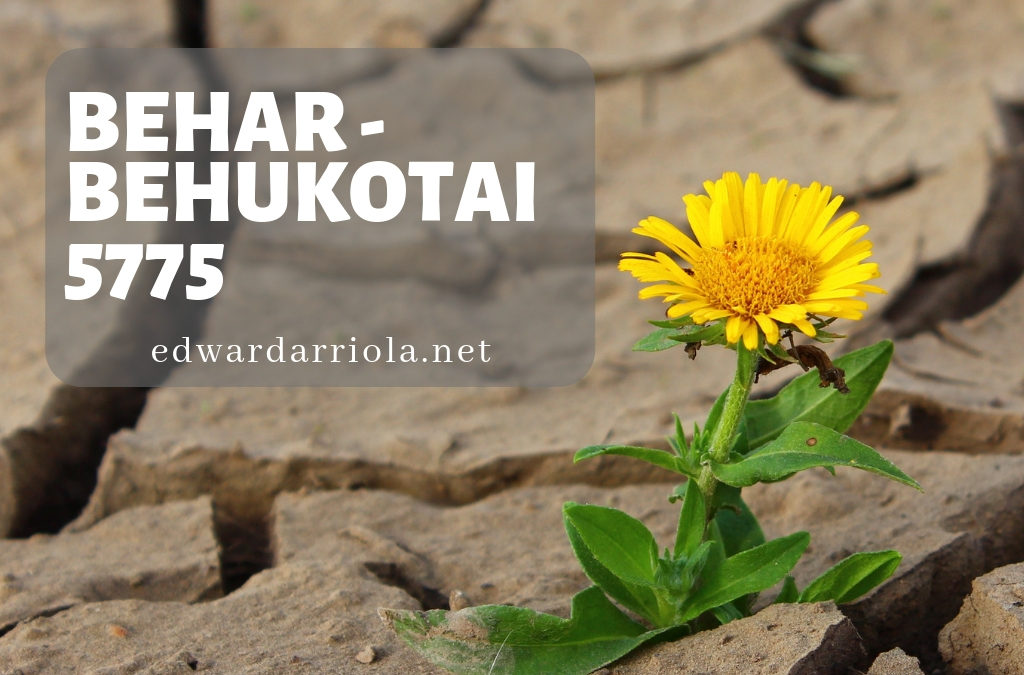I sat down with a man a few weeks ago. He’s a smart, ambitious man with a solid business, and he started talking to me about a major construction project which has been in the midst of some major controversy. I’m going to talk about this project, but I want to be clear that I am not endorsing any side, for or against it.
This project is the Rosemont Mine. A job creating, mountain moving, material sourcing, water scourging project. I knew that to speak ill of this project would grate against him, just as he knew that speaking ill of something I cared about would grate against me. There are major concerns, though, and some of them relate directly to this parashah.
The copper mine I mentioned is promised to use cutting edge technology to use less water and reclaim much of what is used. Arizona has a spotty history of making companies follow through on similar promises, and if they continue that track record, we can expect some problems. However, if they are adhered to, we may have a boon to our local economy at the expense of some gorgeous mountains. Is the tradeoff and risk worth it? I don’t know.
In the very beginning of Behar we read that land must lie fallow every seventh year, and it’s easy to see the establishment of highly practical crop rotation here. But if you continue to verse 23, past all the parts about vegetation, you’ll read “But the land must not be sold beyond reclaim, for the land is Mine; you are but strangers resident with Me.”
Sadly much of what we have done to our land is beyond reclaim, whether it’s been sold to utility companies or altered permanently. As California has mandatory water restrictions already in place, Arizona is gearing up for drought conditions that could be far, far worse.
Lake Mead, once this country’s largest reservoir, stores most of the water for the Colorado River. It’s lowest level has never dipped below 1,080 feet above sea level since the 1930’s, until two weeks ago, when it dropped just below that.
When January 1st comes around next year, if the level of Lake Mead is below 1,075 feet above sea level, there will be extreme water cuts to Arizona’s portion of that reservoir. According to the US Bureau of Reclamation, there’s a 33% chance of that happening this year, but a 75% chance of that happening by 2017.
This terrifies me because in our thirst for growth we are told in verse 17 not to wrong one another when selling land and what we claim from it. While wronging one another traditionally applies to just us Jews, I feel we should broaden the restriction to anyone. And us in the US tend to have a pretty interesting history of wronging each other when it comes to land rights. Whether it was the ousting and slaughter of indigenous populations to get their fertile land, then giving them the worst leftovers we were willing to part with. Whether it was supporting shady oil barons who smooth talked their way into purchasing huge swaths of land, then poisoning it and the surrounding area. Whether it is giant energy conglomerates that shoot pressurized chemicals into underground crevices to extract natural gas and, in the process, poison people’s water supplies.
If you continue to Behukotai, Chapter 26 in Leviticus, verses 18-20, you’ll see where we’re headed, and it’s not pretty. It reads “And if, for all that, you do not obey Me, I will go on to discipline you sevenfold for your sins, and I will break your proud glory. I will make your skies like iron and your earth like copper, so that your strength shall be spent to no purpose. Your land shall not yield its produce, nor shall the trees of the land yield their fruit.”
We are seeing this. We are seeing skies as dry as hot iron in the sun. We are seeing land start to turn hard as we can’t nurture it. We are seeing a proud industry start to crack. Many farmers are having to leave crops in their fields, when they can even grow them in the first place. That is the very dire warning laid out with “so that your strength shall be spent to no purpose.”
So what am I saying?
We have a delicate world, and we’ve already dealt many blows to it. We’ve reduced big fish populations down to paltry numbers, we’ve made our oceans more acidic, we’ve stripped people and land of valuable resources. One of the main things Hashem wants us to do to honor Him is to treat each other, whether they’re our compatriots or our hired help, but especially if they’re a stranger, with respect.
Perhaps if we make a habit of dealing with others respectfully and without underhanded business motives, when we are faced with what NASA is calling a “megadrought”, we’ll weather it better.
I pray that as we pray for rain in Israel, we also receive it here and that we may make a world of peace between us and our land and us and each other. Shabbat shalom.


Saw your posts on Marty’s FB, which led me to click your FB page, which led me to your D’var Torah. I want to compliment you. Both your content and form is beautiful and thought provoking. It helps that I agree with your words, but still…..
I really enjoyed your commentary and wanted you to know.
Kol Hakavod,
jami